University Essay: Integration of Young People in Aged Care Facilities
VerifiedAdded on 2022/10/09
|13
|3737
|10
Essay
AI Summary
This essay, written as part of a NURBN1005 assignment, investigates the complex issue of integrating young people into aged care facilities. It begins by analyzing several research papers focusing on various health challenges faced by young adults, including cancer, HIV, and mental health issues. The essay explores the transition of care from pediatric to adult facilities, highlighting the importance of age-appropriate treatment and support. It references studies on music therapy and the impact of chronic diseases and disabilities on young individuals. The author synthesizes research findings from journals, databases and literature reviews to argue for the benefits and challenges of integrating young people into aged care settings. The essay also touches on the emotional and social changes during adolescence, and the need for specialized care models. The author emphasizes the importance of considering the unique needs of young adults in healthcare settings and the need for proper mental support. This essay provides a comprehensive overview of the topic, drawing on multiple sources to support its analysis.
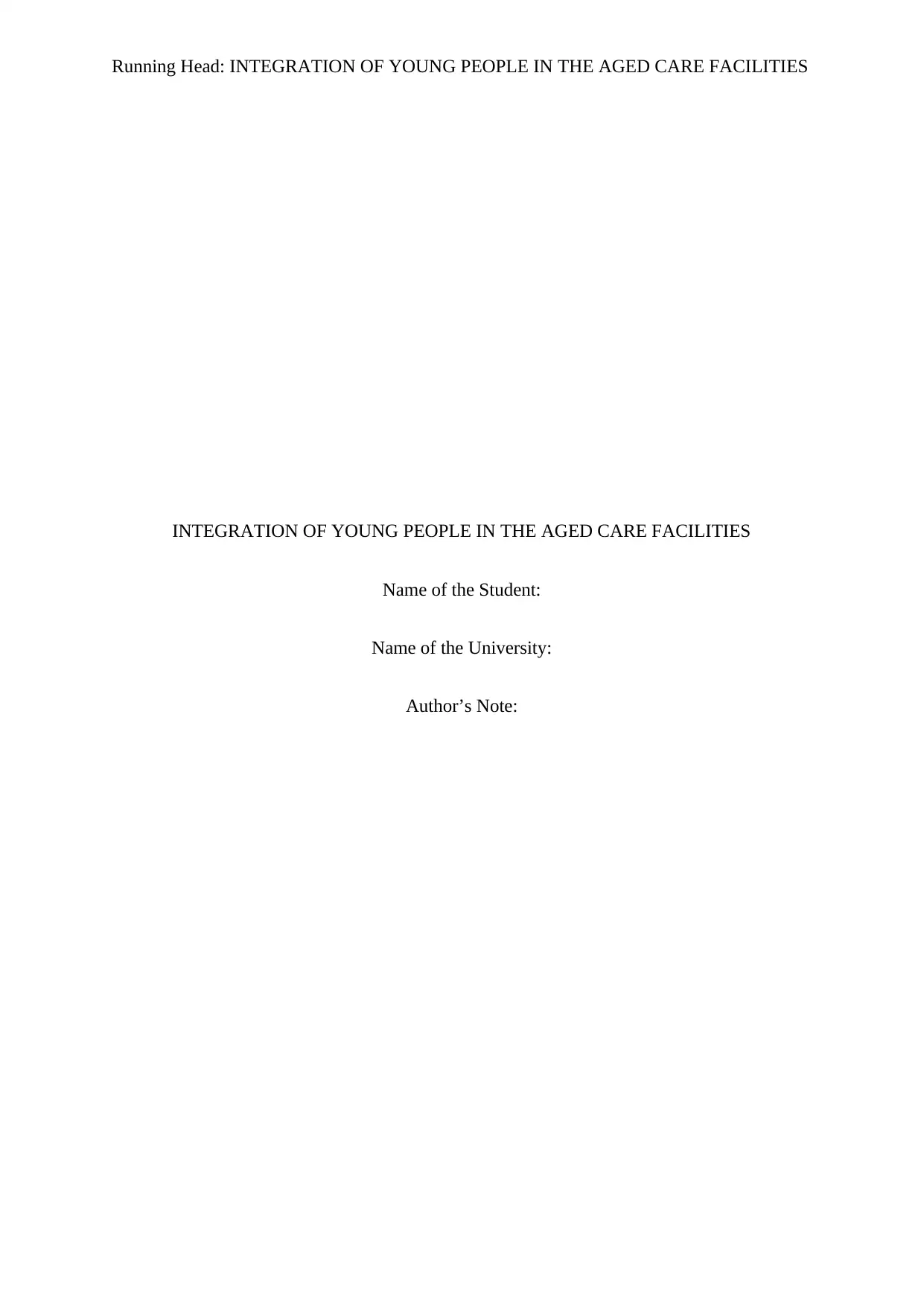
Running Head: INTEGRATION OF YOUNG PEOPLE IN THE AGED CARE FACILITIES
INTEGRATION OF YOUNG PEOPLE IN THE AGED CARE FACILITIES
Name of the Student:
Name of the University:
Author’s Note:
INTEGRATION OF YOUNG PEOPLE IN THE AGED CARE FACILITIES
Name of the Student:
Name of the University:
Author’s Note:
Paraphrase This Document
Need a fresh take? Get an instant paraphrase of this document with our AI Paraphraser
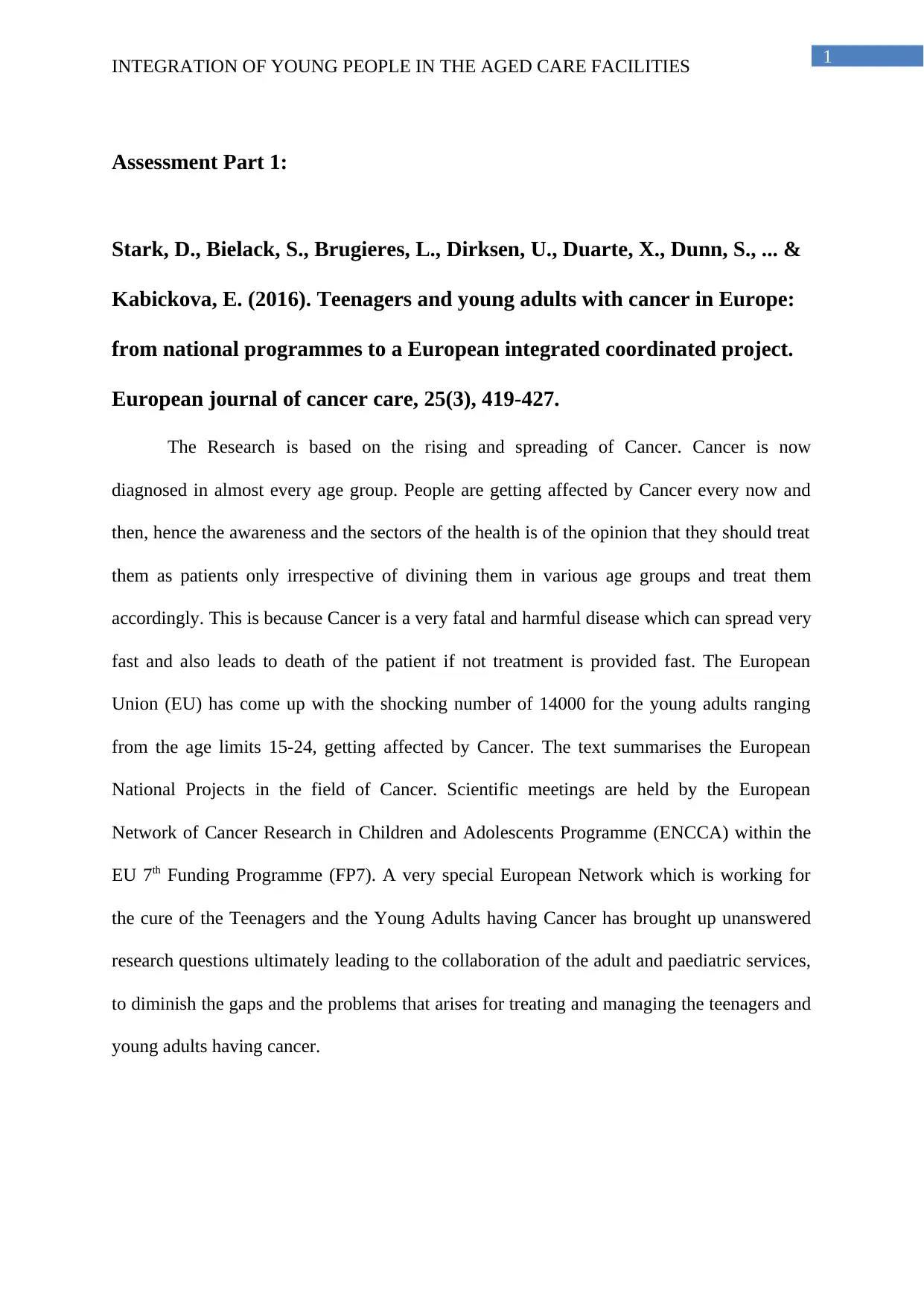
1
INTEGRATION OF YOUNG PEOPLE IN THE AGED CARE FACILITIES
Assessment Part 1:
Stark, D., Bielack, S., Brugieres, L., Dirksen, U., Duarte, X., Dunn, S., ... &
Kabickova, E. (2016). Teenagers and young adults with cancer in Europe:
from national programmes to a European integrated coordinated project.
European journal of cancer care, 25(3), 419-427.
The Research is based on the rising and spreading of Cancer. Cancer is now
diagnosed in almost every age group. People are getting affected by Cancer every now and
then, hence the awareness and the sectors of the health is of the opinion that they should treat
them as patients only irrespective of divining them in various age groups and treat them
accordingly. This is because Cancer is a very fatal and harmful disease which can spread very
fast and also leads to death of the patient if not treatment is provided fast. The European
Union (EU) has come up with the shocking number of 14000 for the young adults ranging
from the age limits 15-24, getting affected by Cancer. The text summarises the European
National Projects in the field of Cancer. Scientific meetings are held by the European
Network of Cancer Research in Children and Adolescents Programme (ENCCA) within the
EU 7th Funding Programme (FP7). A very special European Network which is working for
the cure of the Teenagers and the Young Adults having Cancer has brought up unanswered
research questions ultimately leading to the collaboration of the adult and paediatric services,
to diminish the gaps and the problems that arises for treating and managing the teenagers and
young adults having cancer.
INTEGRATION OF YOUNG PEOPLE IN THE AGED CARE FACILITIES
Assessment Part 1:
Stark, D., Bielack, S., Brugieres, L., Dirksen, U., Duarte, X., Dunn, S., ... &
Kabickova, E. (2016). Teenagers and young adults with cancer in Europe:
from national programmes to a European integrated coordinated project.
European journal of cancer care, 25(3), 419-427.
The Research is based on the rising and spreading of Cancer. Cancer is now
diagnosed in almost every age group. People are getting affected by Cancer every now and
then, hence the awareness and the sectors of the health is of the opinion that they should treat
them as patients only irrespective of divining them in various age groups and treat them
accordingly. This is because Cancer is a very fatal and harmful disease which can spread very
fast and also leads to death of the patient if not treatment is provided fast. The European
Union (EU) has come up with the shocking number of 14000 for the young adults ranging
from the age limits 15-24, getting affected by Cancer. The text summarises the European
National Projects in the field of Cancer. Scientific meetings are held by the European
Network of Cancer Research in Children and Adolescents Programme (ENCCA) within the
EU 7th Funding Programme (FP7). A very special European Network which is working for
the cure of the Teenagers and the Young Adults having Cancer has brought up unanswered
research questions ultimately leading to the collaboration of the adult and paediatric services,
to diminish the gaps and the problems that arises for treating and managing the teenagers and
young adults having cancer.
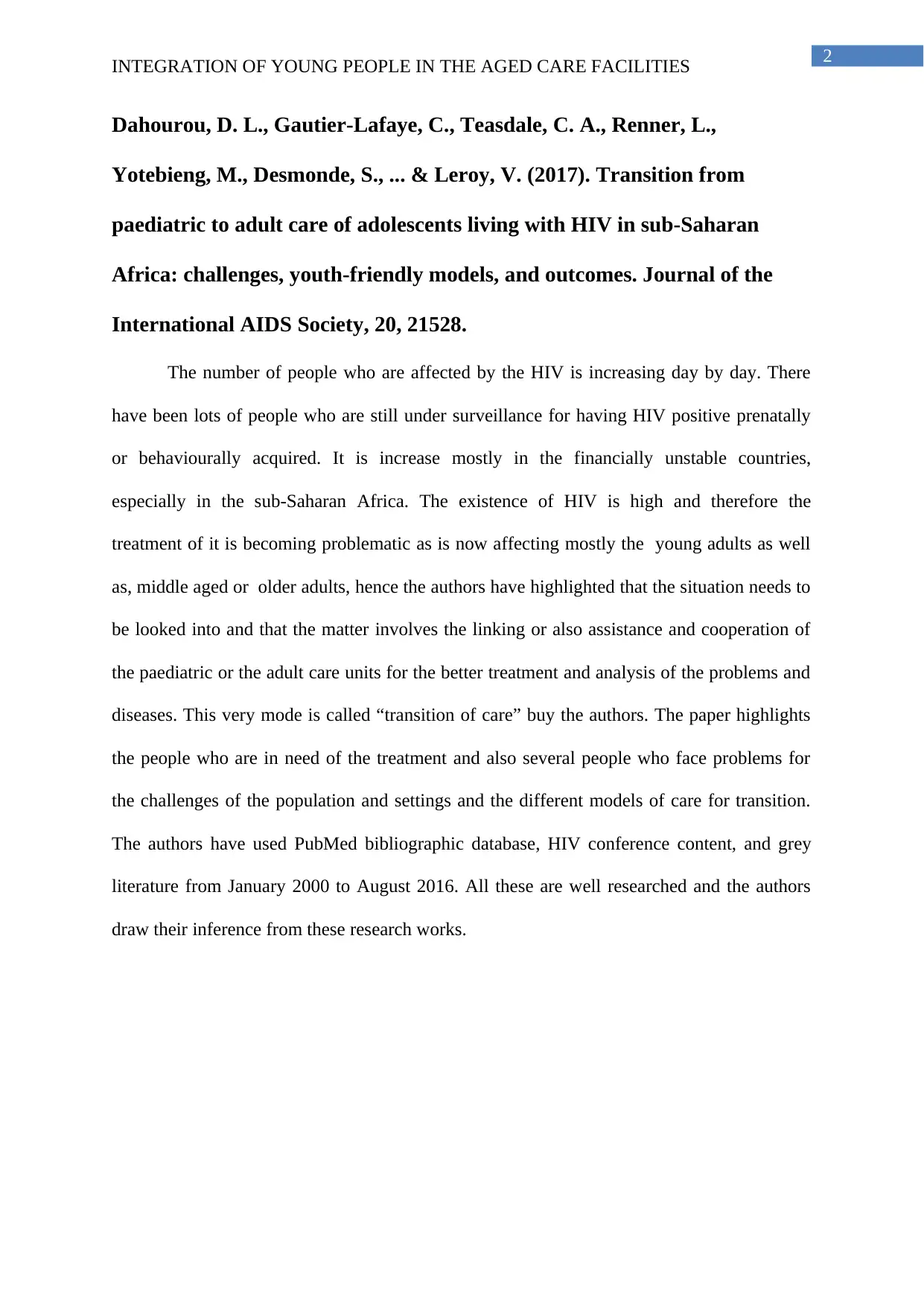
2
INTEGRATION OF YOUNG PEOPLE IN THE AGED CARE FACILITIES
Dahourou, D. L., Gautier‐Lafaye, C., Teasdale, C. A., Renner, L.,
Yotebieng, M., Desmonde, S., ... & Leroy, V. (2017). Transition from
paediatric to adult care of adolescents living with HIV in sub‐Saharan
Africa: challenges, youth‐friendly models, and outcomes. Journal of the
International AIDS Society, 20, 21528.
The number of people who are affected by the HIV is increasing day by day. There
have been lots of people who are still under surveillance for having HIV positive prenatally
or behaviourally acquired. It is increase mostly in the financially unstable countries,
especially in the sub-Saharan Africa. The existence of HIV is high and therefore the
treatment of it is becoming problematic as is now affecting mostly the young adults as well
as, middle aged or older adults, hence the authors have highlighted that the situation needs to
be looked into and that the matter involves the linking or also assistance and cooperation of
the paediatric or the adult care units for the better treatment and analysis of the problems and
diseases. This very mode is called “transition of care” buy the authors. The paper highlights
the people who are in need of the treatment and also several people who face problems for
the challenges of the population and settings and the different models of care for transition.
The authors have used PubMed bibliographic database, HIV conference content, and grey
literature from January 2000 to August 2016. All these are well researched and the authors
draw their inference from these research works.
INTEGRATION OF YOUNG PEOPLE IN THE AGED CARE FACILITIES
Dahourou, D. L., Gautier‐Lafaye, C., Teasdale, C. A., Renner, L.,
Yotebieng, M., Desmonde, S., ... & Leroy, V. (2017). Transition from
paediatric to adult care of adolescents living with HIV in sub‐Saharan
Africa: challenges, youth‐friendly models, and outcomes. Journal of the
International AIDS Society, 20, 21528.
The number of people who are affected by the HIV is increasing day by day. There
have been lots of people who are still under surveillance for having HIV positive prenatally
or behaviourally acquired. It is increase mostly in the financially unstable countries,
especially in the sub-Saharan Africa. The existence of HIV is high and therefore the
treatment of it is becoming problematic as is now affecting mostly the young adults as well
as, middle aged or older adults, hence the authors have highlighted that the situation needs to
be looked into and that the matter involves the linking or also assistance and cooperation of
the paediatric or the adult care units for the better treatment and analysis of the problems and
diseases. This very mode is called “transition of care” buy the authors. The paper highlights
the people who are in need of the treatment and also several people who face problems for
the challenges of the population and settings and the different models of care for transition.
The authors have used PubMed bibliographic database, HIV conference content, and grey
literature from January 2000 to August 2016. All these are well researched and the authors
draw their inference from these research works.
⊘ This is a preview!⊘
Do you want full access?
Subscribe today to unlock all pages.

Trusted by 1+ million students worldwide
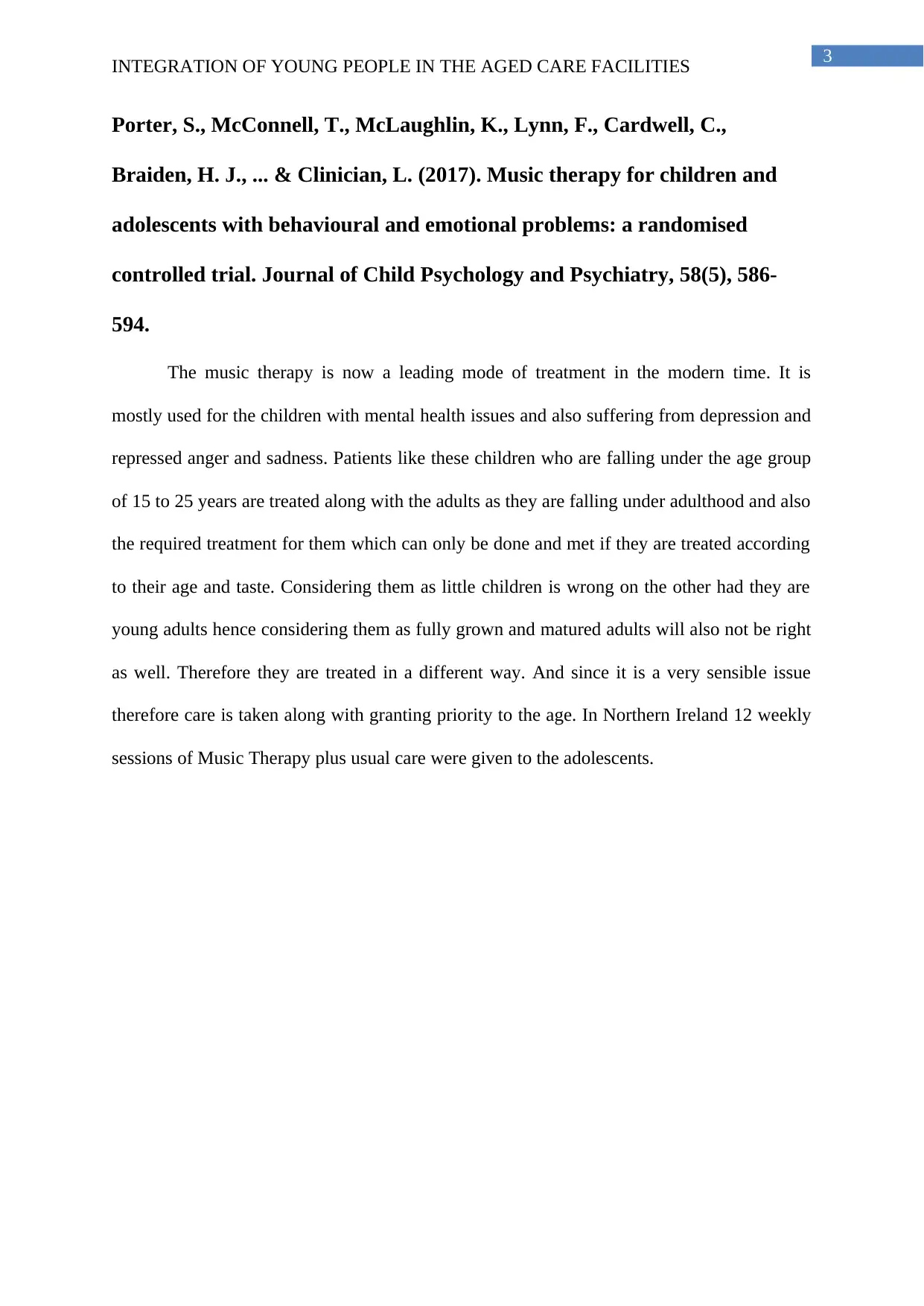
3
INTEGRATION OF YOUNG PEOPLE IN THE AGED CARE FACILITIES
Porter, S., McConnell, T., McLaughlin, K., Lynn, F., Cardwell, C.,
Braiden, H. J., ... & Clinician, L. (2017). Music therapy for children and
adolescents with behavioural and emotional problems: a randomised
controlled trial. Journal of Child Psychology and Psychiatry, 58(5), 586-
594.
The music therapy is now a leading mode of treatment in the modern time. It is
mostly used for the children with mental health issues and also suffering from depression and
repressed anger and sadness. Patients like these children who are falling under the age group
of 15 to 25 years are treated along with the adults as they are falling under adulthood and also
the required treatment for them which can only be done and met if they are treated according
to their age and taste. Considering them as little children is wrong on the other had they are
young adults hence considering them as fully grown and matured adults will also not be right
as well. Therefore they are treated in a different way. And since it is a very sensible issue
therefore care is taken along with granting priority to the age. In Northern Ireland 12 weekly
sessions of Music Therapy plus usual care were given to the adolescents.
INTEGRATION OF YOUNG PEOPLE IN THE AGED CARE FACILITIES
Porter, S., McConnell, T., McLaughlin, K., Lynn, F., Cardwell, C.,
Braiden, H. J., ... & Clinician, L. (2017). Music therapy for children and
adolescents with behavioural and emotional problems: a randomised
controlled trial. Journal of Child Psychology and Psychiatry, 58(5), 586-
594.
The music therapy is now a leading mode of treatment in the modern time. It is
mostly used for the children with mental health issues and also suffering from depression and
repressed anger and sadness. Patients like these children who are falling under the age group
of 15 to 25 years are treated along with the adults as they are falling under adulthood and also
the required treatment for them which can only be done and met if they are treated according
to their age and taste. Considering them as little children is wrong on the other had they are
young adults hence considering them as fully grown and matured adults will also not be right
as well. Therefore they are treated in a different way. And since it is a very sensible issue
therefore care is taken along with granting priority to the age. In Northern Ireland 12 weekly
sessions of Music Therapy plus usual care were given to the adolescents.
Paraphrase This Document
Need a fresh take? Get an instant paraphrase of this document with our AI Paraphraser
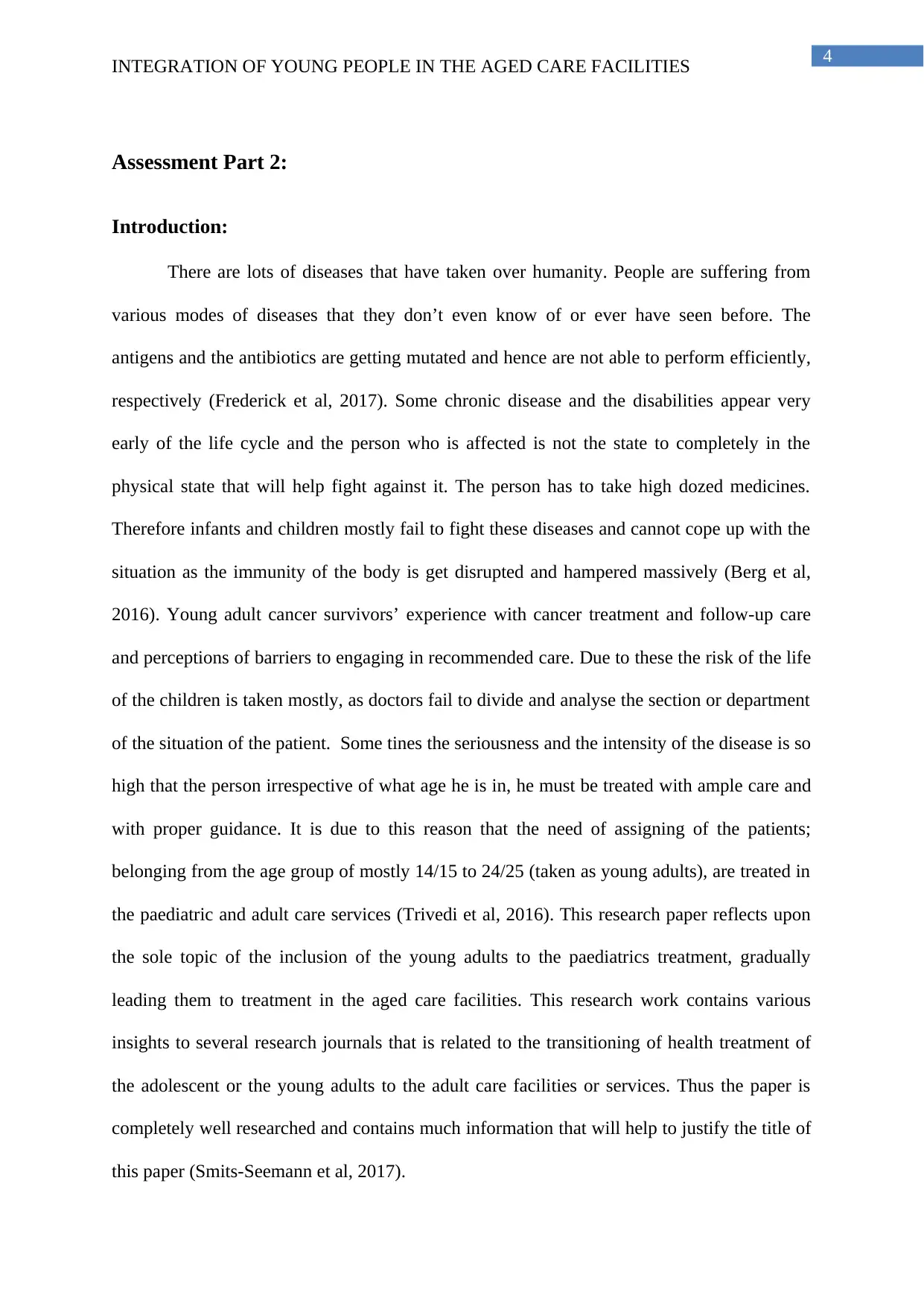
4
INTEGRATION OF YOUNG PEOPLE IN THE AGED CARE FACILITIES
Assessment Part 2:
Introduction:
There are lots of diseases that have taken over humanity. People are suffering from
various modes of diseases that they don’t even know of or ever have seen before. The
antigens and the antibiotics are getting mutated and hence are not able to perform efficiently,
respectively (Frederick et al, 2017). Some chronic disease and the disabilities appear very
early of the life cycle and the person who is affected is not the state to completely in the
physical state that will help fight against it. The person has to take high dozed medicines.
Therefore infants and children mostly fail to fight these diseases and cannot cope up with the
situation as the immunity of the body is get disrupted and hampered massively (Berg et al,
2016). Young adult cancer survivors’ experience with cancer treatment and follow-up care
and perceptions of barriers to engaging in recommended care. Due to these the risk of the life
of the children is taken mostly, as doctors fail to divide and analyse the section or department
of the situation of the patient. Some tines the seriousness and the intensity of the disease is so
high that the person irrespective of what age he is in, he must be treated with ample care and
with proper guidance. It is due to this reason that the need of assigning of the patients;
belonging from the age group of mostly 14/15 to 24/25 (taken as young adults), are treated in
the paediatric and adult care services (Trivedi et al, 2016). This research paper reflects upon
the sole topic of the inclusion of the young adults to the paediatrics treatment, gradually
leading them to treatment in the aged care facilities. This research work contains various
insights to several research journals that is related to the transitioning of health treatment of
the adolescent or the young adults to the adult care facilities or services. Thus the paper is
completely well researched and contains much information that will help to justify the title of
this paper (Smits-Seemann et al, 2017).
INTEGRATION OF YOUNG PEOPLE IN THE AGED CARE FACILITIES
Assessment Part 2:
Introduction:
There are lots of diseases that have taken over humanity. People are suffering from
various modes of diseases that they don’t even know of or ever have seen before. The
antigens and the antibiotics are getting mutated and hence are not able to perform efficiently,
respectively (Frederick et al, 2017). Some chronic disease and the disabilities appear very
early of the life cycle and the person who is affected is not the state to completely in the
physical state that will help fight against it. The person has to take high dozed medicines.
Therefore infants and children mostly fail to fight these diseases and cannot cope up with the
situation as the immunity of the body is get disrupted and hampered massively (Berg et al,
2016). Young adult cancer survivors’ experience with cancer treatment and follow-up care
and perceptions of barriers to engaging in recommended care. Due to these the risk of the life
of the children is taken mostly, as doctors fail to divide and analyse the section or department
of the situation of the patient. Some tines the seriousness and the intensity of the disease is so
high that the person irrespective of what age he is in, he must be treated with ample care and
with proper guidance. It is due to this reason that the need of assigning of the patients;
belonging from the age group of mostly 14/15 to 24/25 (taken as young adults), are treated in
the paediatric and adult care services (Trivedi et al, 2016). This research paper reflects upon
the sole topic of the inclusion of the young adults to the paediatrics treatment, gradually
leading them to treatment in the aged care facilities. This research work contains various
insights to several research journals that is related to the transitioning of health treatment of
the adolescent or the young adults to the adult care facilities or services. Thus the paper is
completely well researched and contains much information that will help to justify the title of
this paper (Smits-Seemann et al, 2017).
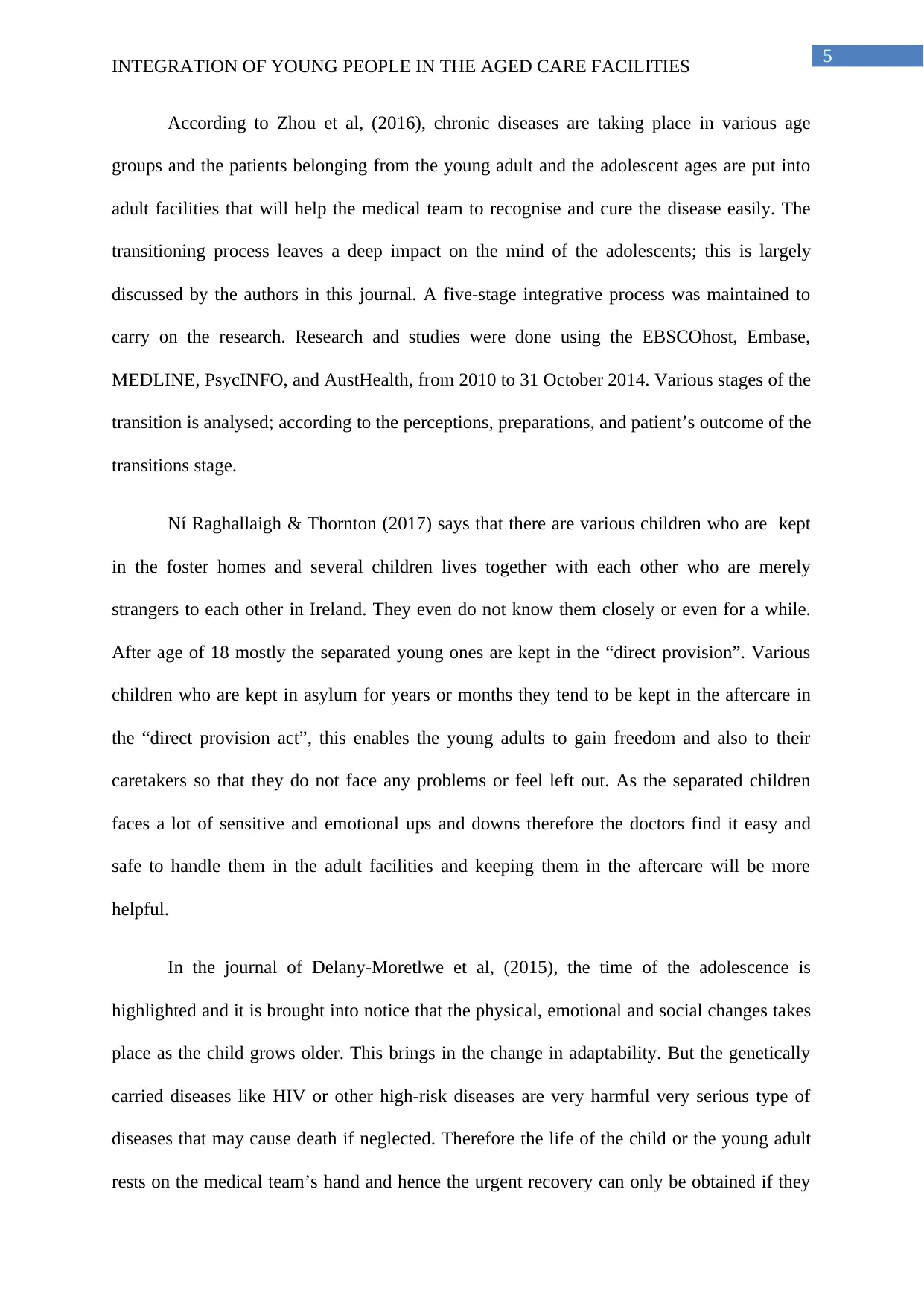
5
INTEGRATION OF YOUNG PEOPLE IN THE AGED CARE FACILITIES
According to Zhou et al, (2016), chronic diseases are taking place in various age
groups and the patients belonging from the young adult and the adolescent ages are put into
adult facilities that will help the medical team to recognise and cure the disease easily. The
transitioning process leaves a deep impact on the mind of the adolescents; this is largely
discussed by the authors in this journal. A five-stage integrative process was maintained to
carry on the research. Research and studies were done using the EBSCOhost, Embase,
MEDLINE, PsycINFO, and AustHealth, from 2010 to 31 October 2014. Various stages of the
transition is analysed; according to the perceptions, preparations, and patient’s outcome of the
transitions stage.
Ní Raghallaigh & Thornton (2017) says that there are various children who are kept
in the foster homes and several children lives together with each other who are merely
strangers to each other in Ireland. They even do not know them closely or even for a while.
After age of 18 mostly the separated young ones are kept in the “direct provision”. Various
children who are kept in asylum for years or months they tend to be kept in the aftercare in
the “direct provision act”, this enables the young adults to gain freedom and also to their
caretakers so that they do not face any problems or feel left out. As the separated children
faces a lot of sensitive and emotional ups and downs therefore the doctors find it easy and
safe to handle them in the adult facilities and keeping them in the aftercare will be more
helpful.
In the journal of Delany‐Moretlwe et al, (2015), the time of the adolescence is
highlighted and it is brought into notice that the physical, emotional and social changes takes
place as the child grows older. This brings in the change in adaptability. But the genetically
carried diseases like HIV or other high-risk diseases are very harmful very serious type of
diseases that may cause death if neglected. Therefore the life of the child or the young adult
rests on the medical team’s hand and hence the urgent recovery can only be obtained if they
INTEGRATION OF YOUNG PEOPLE IN THE AGED CARE FACILITIES
According to Zhou et al, (2016), chronic diseases are taking place in various age
groups and the patients belonging from the young adult and the adolescent ages are put into
adult facilities that will help the medical team to recognise and cure the disease easily. The
transitioning process leaves a deep impact on the mind of the adolescents; this is largely
discussed by the authors in this journal. A five-stage integrative process was maintained to
carry on the research. Research and studies were done using the EBSCOhost, Embase,
MEDLINE, PsycINFO, and AustHealth, from 2010 to 31 October 2014. Various stages of the
transition is analysed; according to the perceptions, preparations, and patient’s outcome of the
transitions stage.
Ní Raghallaigh & Thornton (2017) says that there are various children who are kept
in the foster homes and several children lives together with each other who are merely
strangers to each other in Ireland. They even do not know them closely or even for a while.
After age of 18 mostly the separated young ones are kept in the “direct provision”. Various
children who are kept in asylum for years or months they tend to be kept in the aftercare in
the “direct provision act”, this enables the young adults to gain freedom and also to their
caretakers so that they do not face any problems or feel left out. As the separated children
faces a lot of sensitive and emotional ups and downs therefore the doctors find it easy and
safe to handle them in the adult facilities and keeping them in the aftercare will be more
helpful.
In the journal of Delany‐Moretlwe et al, (2015), the time of the adolescence is
highlighted and it is brought into notice that the physical, emotional and social changes takes
place as the child grows older. This brings in the change in adaptability. But the genetically
carried diseases like HIV or other high-risk diseases are very harmful very serious type of
diseases that may cause death if neglected. Therefore the life of the child or the young adult
rests on the medical team’s hand and hence the urgent recovery can only be obtained if they
⊘ This is a preview!⊘
Do you want full access?
Subscribe today to unlock all pages.

Trusted by 1+ million students worldwide
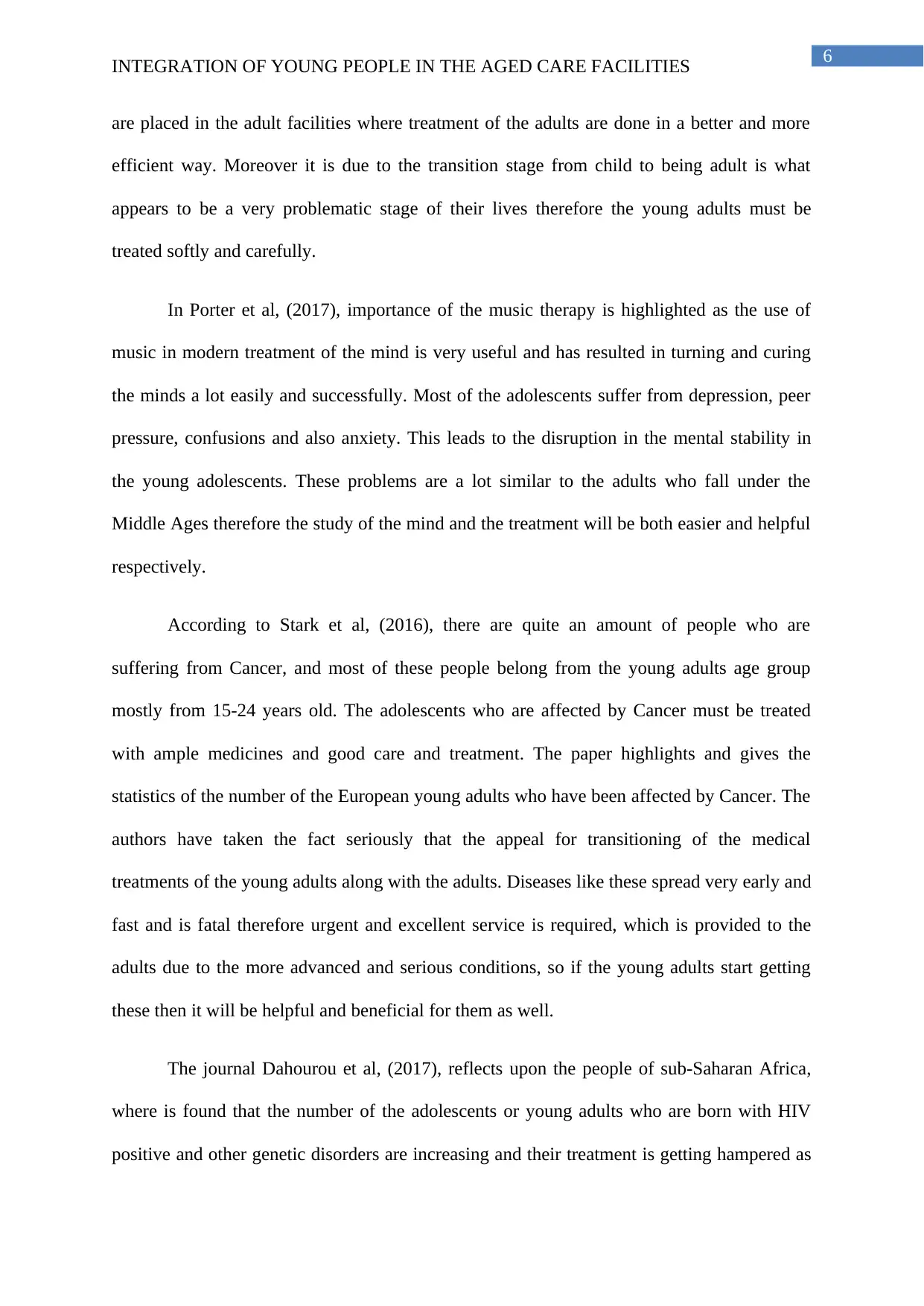
6
INTEGRATION OF YOUNG PEOPLE IN THE AGED CARE FACILITIES
are placed in the adult facilities where treatment of the adults are done in a better and more
efficient way. Moreover it is due to the transition stage from child to being adult is what
appears to be a very problematic stage of their lives therefore the young adults must be
treated softly and carefully.
In Porter et al, (2017), importance of the music therapy is highlighted as the use of
music in modern treatment of the mind is very useful and has resulted in turning and curing
the minds a lot easily and successfully. Most of the adolescents suffer from depression, peer
pressure, confusions and also anxiety. This leads to the disruption in the mental stability in
the young adolescents. These problems are a lot similar to the adults who fall under the
Middle Ages therefore the study of the mind and the treatment will be both easier and helpful
respectively.
According to Stark et al, (2016), there are quite an amount of people who are
suffering from Cancer, and most of these people belong from the young adults age group
mostly from 15-24 years old. The adolescents who are affected by Cancer must be treated
with ample medicines and good care and treatment. The paper highlights and gives the
statistics of the number of the European young adults who have been affected by Cancer. The
authors have taken the fact seriously that the appeal for transitioning of the medical
treatments of the young adults along with the adults. Diseases like these spread very early and
fast and is fatal therefore urgent and excellent service is required, which is provided to the
adults due to the more advanced and serious conditions, so if the young adults start getting
these then it will be helpful and beneficial for them as well.
The journal Dahourou et al, (2017), reflects upon the people of sub-Saharan Africa,
where is found that the number of the adolescents or young adults who are born with HIV
positive and other genetic disorders are increasing and their treatment is getting hampered as
INTEGRATION OF YOUNG PEOPLE IN THE AGED CARE FACILITIES
are placed in the adult facilities where treatment of the adults are done in a better and more
efficient way. Moreover it is due to the transition stage from child to being adult is what
appears to be a very problematic stage of their lives therefore the young adults must be
treated softly and carefully.
In Porter et al, (2017), importance of the music therapy is highlighted as the use of
music in modern treatment of the mind is very useful and has resulted in turning and curing
the minds a lot easily and successfully. Most of the adolescents suffer from depression, peer
pressure, confusions and also anxiety. This leads to the disruption in the mental stability in
the young adolescents. These problems are a lot similar to the adults who fall under the
Middle Ages therefore the study of the mind and the treatment will be both easier and helpful
respectively.
According to Stark et al, (2016), there are quite an amount of people who are
suffering from Cancer, and most of these people belong from the young adults age group
mostly from 15-24 years old. The adolescents who are affected by Cancer must be treated
with ample medicines and good care and treatment. The paper highlights and gives the
statistics of the number of the European young adults who have been affected by Cancer. The
authors have taken the fact seriously that the appeal for transitioning of the medical
treatments of the young adults along with the adults. Diseases like these spread very early and
fast and is fatal therefore urgent and excellent service is required, which is provided to the
adults due to the more advanced and serious conditions, so if the young adults start getting
these then it will be helpful and beneficial for them as well.
The journal Dahourou et al, (2017), reflects upon the people of sub-Saharan Africa,
where is found that the number of the adolescents or young adults who are born with HIV
positive and other genetic disorders are increasing and their treatment is getting hampered as
Paraphrase This Document
Need a fresh take? Get an instant paraphrase of this document with our AI Paraphraser
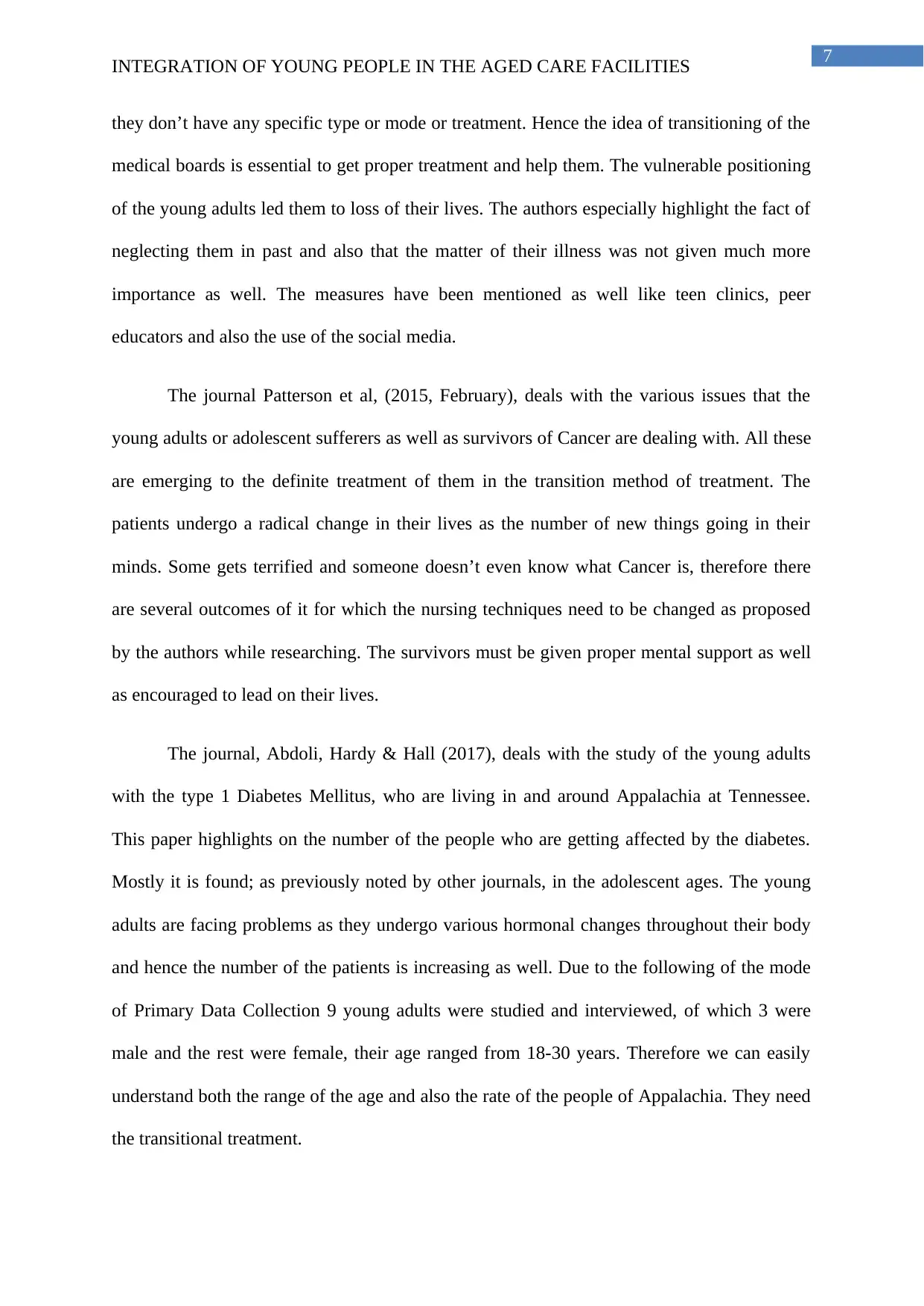
7
INTEGRATION OF YOUNG PEOPLE IN THE AGED CARE FACILITIES
they don’t have any specific type or mode or treatment. Hence the idea of transitioning of the
medical boards is essential to get proper treatment and help them. The vulnerable positioning
of the young adults led them to loss of their lives. The authors especially highlight the fact of
neglecting them in past and also that the matter of their illness was not given much more
importance as well. The measures have been mentioned as well like teen clinics, peer
educators and also the use of the social media.
The journal Patterson et al, (2015, February), deals with the various issues that the
young adults or adolescent sufferers as well as survivors of Cancer are dealing with. All these
are emerging to the definite treatment of them in the transition method of treatment. The
patients undergo a radical change in their lives as the number of new things going in their
minds. Some gets terrified and someone doesn’t even know what Cancer is, therefore there
are several outcomes of it for which the nursing techniques need to be changed as proposed
by the authors while researching. The survivors must be given proper mental support as well
as encouraged to lead on their lives.
The journal, Abdoli, Hardy & Hall (2017), deals with the study of the young adults
with the type 1 Diabetes Mellitus, who are living in and around Appalachia at Tennessee.
This paper highlights on the number of the people who are getting affected by the diabetes.
Mostly it is found; as previously noted by other journals, in the adolescent ages. The young
adults are facing problems as they undergo various hormonal changes throughout their body
and hence the number of the patients is increasing as well. Due to the following of the mode
of Primary Data Collection 9 young adults were studied and interviewed, of which 3 were
male and the rest were female, their age ranged from 18-30 years. Therefore we can easily
understand both the range of the age and also the rate of the people of Appalachia. They need
the transitional treatment.
INTEGRATION OF YOUNG PEOPLE IN THE AGED CARE FACILITIES
they don’t have any specific type or mode or treatment. Hence the idea of transitioning of the
medical boards is essential to get proper treatment and help them. The vulnerable positioning
of the young adults led them to loss of their lives. The authors especially highlight the fact of
neglecting them in past and also that the matter of their illness was not given much more
importance as well. The measures have been mentioned as well like teen clinics, peer
educators and also the use of the social media.
The journal Patterson et al, (2015, February), deals with the various issues that the
young adults or adolescent sufferers as well as survivors of Cancer are dealing with. All these
are emerging to the definite treatment of them in the transition method of treatment. The
patients undergo a radical change in their lives as the number of new things going in their
minds. Some gets terrified and someone doesn’t even know what Cancer is, therefore there
are several outcomes of it for which the nursing techniques need to be changed as proposed
by the authors while researching. The survivors must be given proper mental support as well
as encouraged to lead on their lives.
The journal, Abdoli, Hardy & Hall (2017), deals with the study of the young adults
with the type 1 Diabetes Mellitus, who are living in and around Appalachia at Tennessee.
This paper highlights on the number of the people who are getting affected by the diabetes.
Mostly it is found; as previously noted by other journals, in the adolescent ages. The young
adults are facing problems as they undergo various hormonal changes throughout their body
and hence the number of the patients is increasing as well. Due to the following of the mode
of Primary Data Collection 9 young adults were studied and interviewed, of which 3 were
male and the rest were female, their age ranged from 18-30 years. Therefore we can easily
understand both the range of the age and also the rate of the people of Appalachia. They need
the transitional treatment.
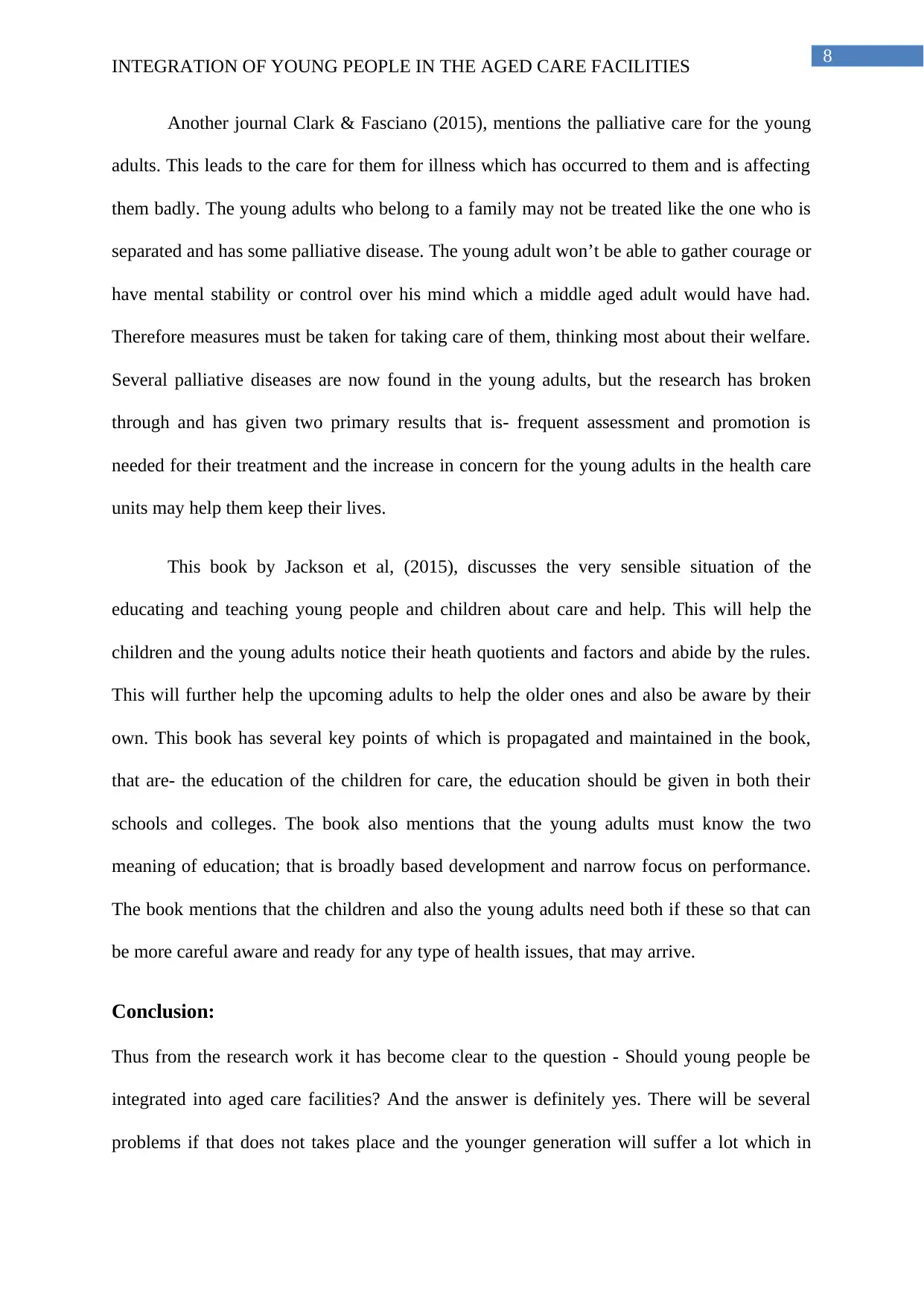
8
INTEGRATION OF YOUNG PEOPLE IN THE AGED CARE FACILITIES
Another journal Clark & Fasciano (2015), mentions the palliative care for the young
adults. This leads to the care for them for illness which has occurred to them and is affecting
them badly. The young adults who belong to a family may not be treated like the one who is
separated and has some palliative disease. The young adult won’t be able to gather courage or
have mental stability or control over his mind which a middle aged adult would have had.
Therefore measures must be taken for taking care of them, thinking most about their welfare.
Several palliative diseases are now found in the young adults, but the research has broken
through and has given two primary results that is- frequent assessment and promotion is
needed for their treatment and the increase in concern for the young adults in the health care
units may help them keep their lives.
This book by Jackson et al, (2015), discusses the very sensible situation of the
educating and teaching young people and children about care and help. This will help the
children and the young adults notice their heath quotients and factors and abide by the rules.
This will further help the upcoming adults to help the older ones and also be aware by their
own. This book has several key points of which is propagated and maintained in the book,
that are- the education of the children for care, the education should be given in both their
schools and colleges. The book also mentions that the young adults must know the two
meaning of education; that is broadly based development and narrow focus on performance.
The book mentions that the children and also the young adults need both if these so that can
be more careful aware and ready for any type of health issues, that may arrive.
Conclusion:
Thus from the research work it has become clear to the question - Should young people be
integrated into aged care facilities? And the answer is definitely yes. There will be several
problems if that does not takes place and the younger generation will suffer a lot which in
INTEGRATION OF YOUNG PEOPLE IN THE AGED CARE FACILITIES
Another journal Clark & Fasciano (2015), mentions the palliative care for the young
adults. This leads to the care for them for illness which has occurred to them and is affecting
them badly. The young adults who belong to a family may not be treated like the one who is
separated and has some palliative disease. The young adult won’t be able to gather courage or
have mental stability or control over his mind which a middle aged adult would have had.
Therefore measures must be taken for taking care of them, thinking most about their welfare.
Several palliative diseases are now found in the young adults, but the research has broken
through and has given two primary results that is- frequent assessment and promotion is
needed for their treatment and the increase in concern for the young adults in the health care
units may help them keep their lives.
This book by Jackson et al, (2015), discusses the very sensible situation of the
educating and teaching young people and children about care and help. This will help the
children and the young adults notice their heath quotients and factors and abide by the rules.
This will further help the upcoming adults to help the older ones and also be aware by their
own. This book has several key points of which is propagated and maintained in the book,
that are- the education of the children for care, the education should be given in both their
schools and colleges. The book also mentions that the young adults must know the two
meaning of education; that is broadly based development and narrow focus on performance.
The book mentions that the children and also the young adults need both if these so that can
be more careful aware and ready for any type of health issues, that may arrive.
Conclusion:
Thus from the research work it has become clear to the question - Should young people be
integrated into aged care facilities? And the answer is definitely yes. There will be several
problems if that does not takes place and the younger generation will suffer a lot which in
⊘ This is a preview!⊘
Do you want full access?
Subscribe today to unlock all pages.

Trusted by 1+ million students worldwide
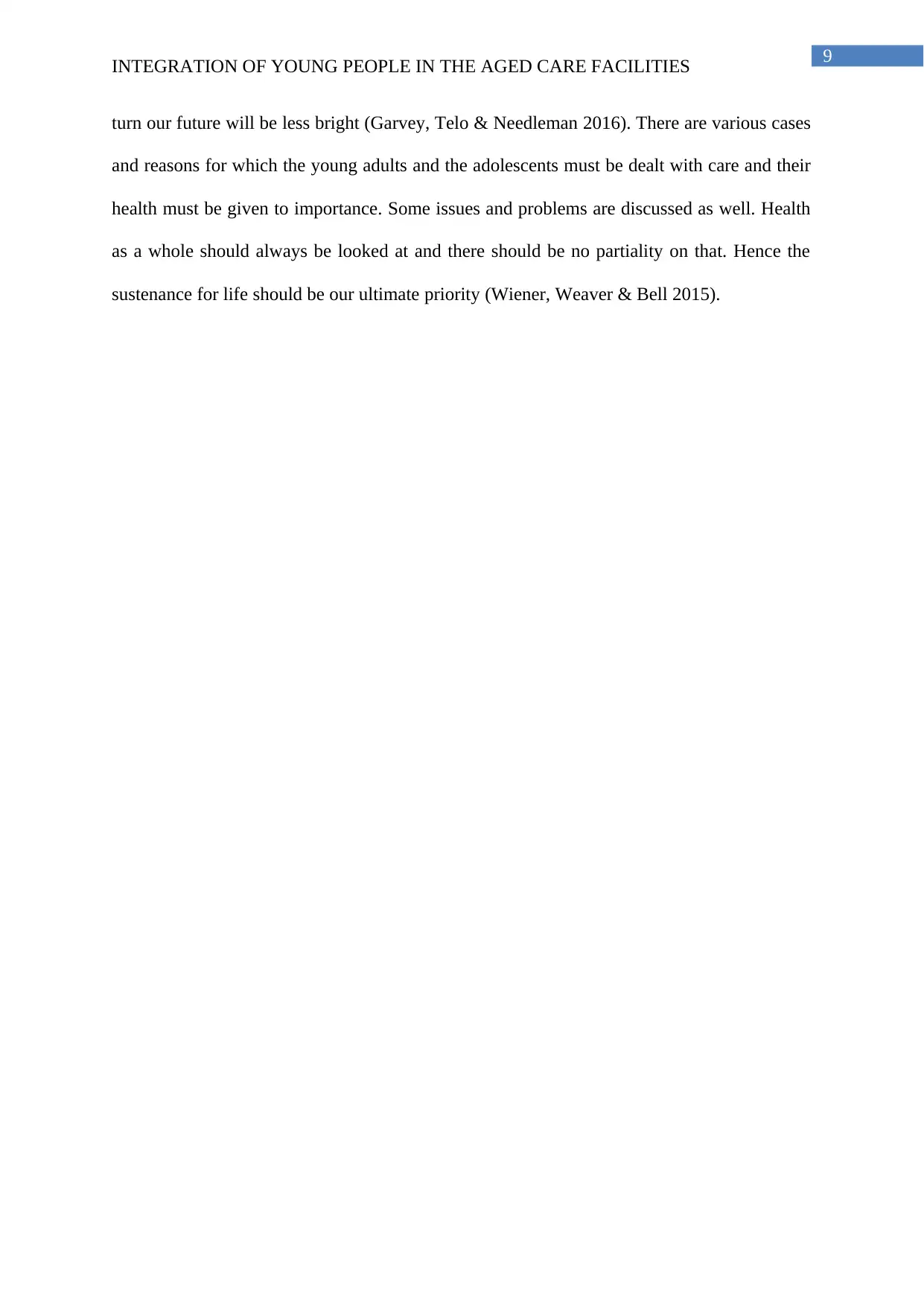
9
INTEGRATION OF YOUNG PEOPLE IN THE AGED CARE FACILITIES
turn our future will be less bright (Garvey, Telo & Needleman 2016). There are various cases
and reasons for which the young adults and the adolescents must be dealt with care and their
health must be given to importance. Some issues and problems are discussed as well. Health
as a whole should always be looked at and there should be no partiality on that. Hence the
sustenance for life should be our ultimate priority (Wiener, Weaver & Bell 2015).
INTEGRATION OF YOUNG PEOPLE IN THE AGED CARE FACILITIES
turn our future will be less bright (Garvey, Telo & Needleman 2016). There are various cases
and reasons for which the young adults and the adolescents must be dealt with care and their
health must be given to importance. Some issues and problems are discussed as well. Health
as a whole should always be looked at and there should be no partiality on that. Hence the
sustenance for life should be our ultimate priority (Wiener, Weaver & Bell 2015).
Paraphrase This Document
Need a fresh take? Get an instant paraphrase of this document with our AI Paraphraser
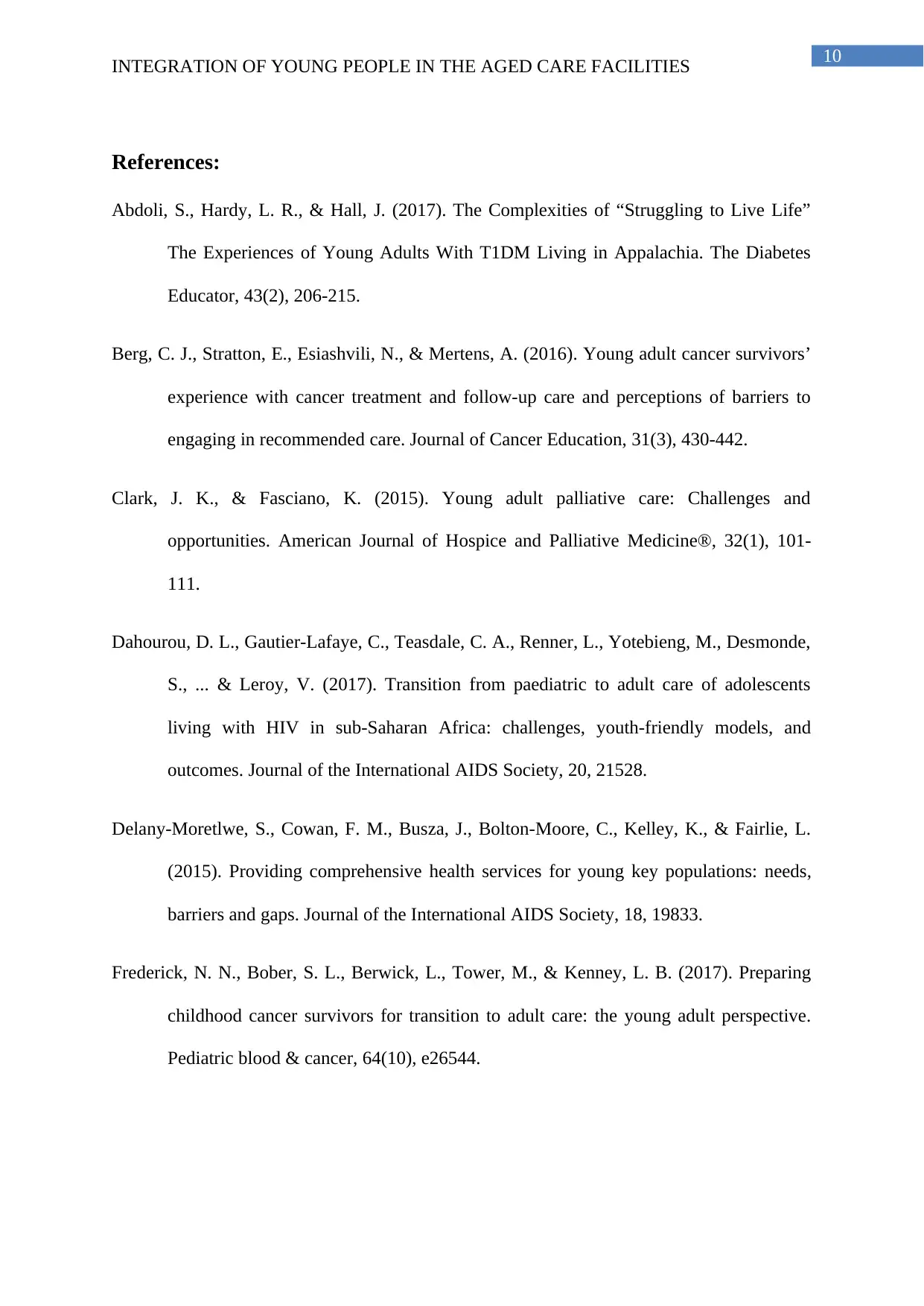
10
INTEGRATION OF YOUNG PEOPLE IN THE AGED CARE FACILITIES
References:
Abdoli, S., Hardy, L. R., & Hall, J. (2017). The Complexities of “Struggling to Live Life”
The Experiences of Young Adults With T1DM Living in Appalachia. The Diabetes
Educator, 43(2), 206-215.
Berg, C. J., Stratton, E., Esiashvili, N., & Mertens, A. (2016). Young adult cancer survivors’
experience with cancer treatment and follow-up care and perceptions of barriers to
engaging in recommended care. Journal of Cancer Education, 31(3), 430-442.
Clark, J. K., & Fasciano, K. (2015). Young adult palliative care: Challenges and
opportunities. American Journal of Hospice and Palliative Medicine®, 32(1), 101-
111.
Dahourou, D. L., Gautier‐Lafaye, C., Teasdale, C. A., Renner, L., Yotebieng, M., Desmonde,
S., ... & Leroy, V. (2017). Transition from paediatric to adult care of adolescents
living with HIV in sub‐Saharan Africa: challenges, youth‐friendly models, and
outcomes. Journal of the International AIDS Society, 20, 21528.
Delany‐Moretlwe, S., Cowan, F. M., Busza, J., Bolton‐Moore, C., Kelley, K., & Fairlie, L.
(2015). Providing comprehensive health services for young key populations: needs,
barriers and gaps. Journal of the International AIDS Society, 18, 19833.
Frederick, N. N., Bober, S. L., Berwick, L., Tower, M., & Kenney, L. B. (2017). Preparing
childhood cancer survivors for transition to adult care: the young adult perspective.
Pediatric blood & cancer, 64(10), e26544.
INTEGRATION OF YOUNG PEOPLE IN THE AGED CARE FACILITIES
References:
Abdoli, S., Hardy, L. R., & Hall, J. (2017). The Complexities of “Struggling to Live Life”
The Experiences of Young Adults With T1DM Living in Appalachia. The Diabetes
Educator, 43(2), 206-215.
Berg, C. J., Stratton, E., Esiashvili, N., & Mertens, A. (2016). Young adult cancer survivors’
experience with cancer treatment and follow-up care and perceptions of barriers to
engaging in recommended care. Journal of Cancer Education, 31(3), 430-442.
Clark, J. K., & Fasciano, K. (2015). Young adult palliative care: Challenges and
opportunities. American Journal of Hospice and Palliative Medicine®, 32(1), 101-
111.
Dahourou, D. L., Gautier‐Lafaye, C., Teasdale, C. A., Renner, L., Yotebieng, M., Desmonde,
S., ... & Leroy, V. (2017). Transition from paediatric to adult care of adolescents
living with HIV in sub‐Saharan Africa: challenges, youth‐friendly models, and
outcomes. Journal of the International AIDS Society, 20, 21528.
Delany‐Moretlwe, S., Cowan, F. M., Busza, J., Bolton‐Moore, C., Kelley, K., & Fairlie, L.
(2015). Providing comprehensive health services for young key populations: needs,
barriers and gaps. Journal of the International AIDS Society, 18, 19833.
Frederick, N. N., Bober, S. L., Berwick, L., Tower, M., & Kenney, L. B. (2017). Preparing
childhood cancer survivors for transition to adult care: the young adult perspective.
Pediatric blood & cancer, 64(10), e26544.
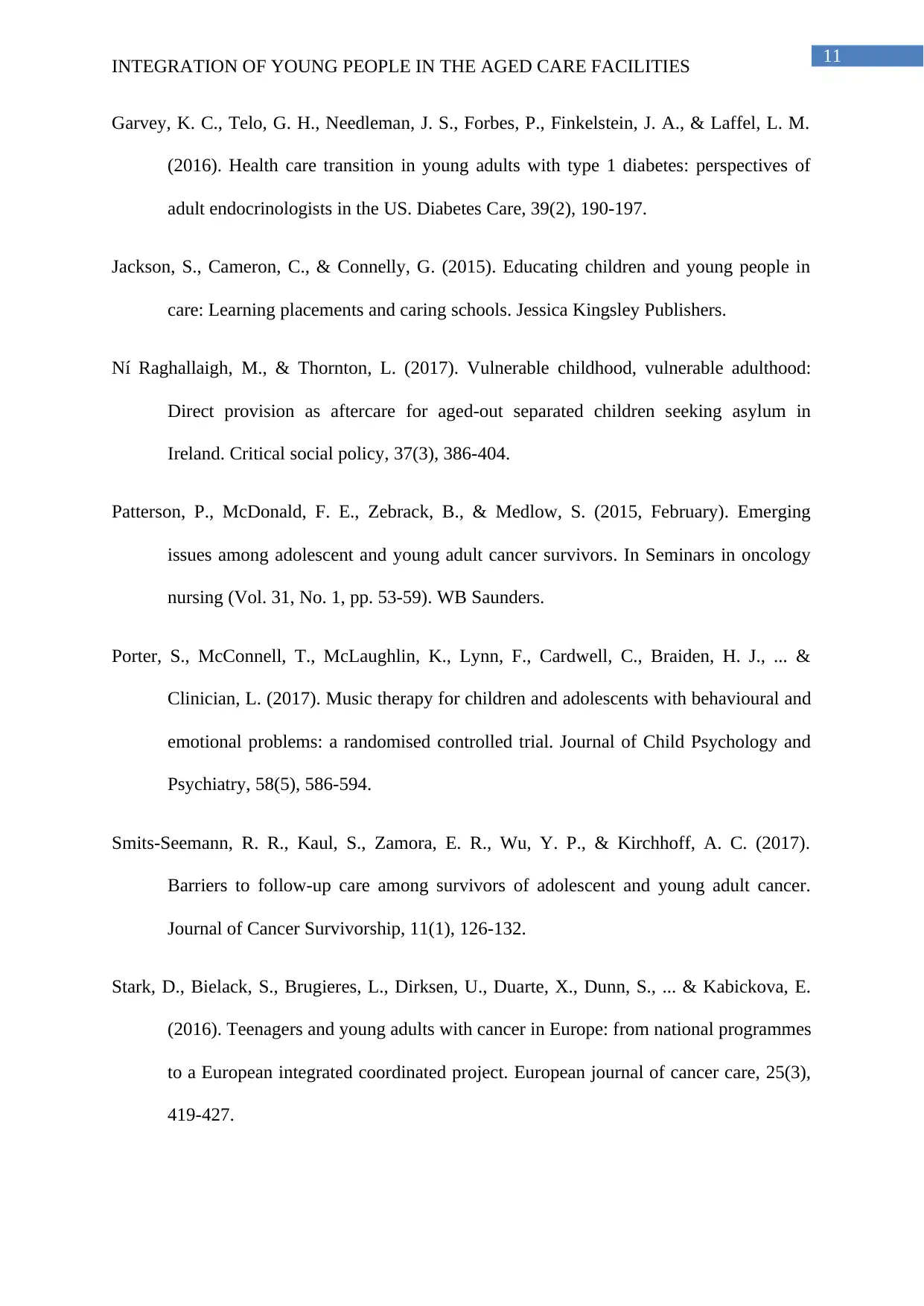
11
INTEGRATION OF YOUNG PEOPLE IN THE AGED CARE FACILITIES
Garvey, K. C., Telo, G. H., Needleman, J. S., Forbes, P., Finkelstein, J. A., & Laffel, L. M.
(2016). Health care transition in young adults with type 1 diabetes: perspectives of
adult endocrinologists in the US. Diabetes Care, 39(2), 190-197.
Jackson, S., Cameron, C., & Connelly, G. (2015). Educating children and young people in
care: Learning placements and caring schools. Jessica Kingsley Publishers.
Ní Raghallaigh, M., & Thornton, L. (2017). Vulnerable childhood, vulnerable adulthood:
Direct provision as aftercare for aged-out separated children seeking asylum in
Ireland. Critical social policy, 37(3), 386-404.
Patterson, P., McDonald, F. E., Zebrack, B., & Medlow, S. (2015, February). Emerging
issues among adolescent and young adult cancer survivors. In Seminars in oncology
nursing (Vol. 31, No. 1, pp. 53-59). WB Saunders.
Porter, S., McConnell, T., McLaughlin, K., Lynn, F., Cardwell, C., Braiden, H. J., ... &
Clinician, L. (2017). Music therapy for children and adolescents with behavioural and
emotional problems: a randomised controlled trial. Journal of Child Psychology and
Psychiatry, 58(5), 586-594.
Smits-Seemann, R. R., Kaul, S., Zamora, E. R., Wu, Y. P., & Kirchhoff, A. C. (2017).
Barriers to follow-up care among survivors of adolescent and young adult cancer.
Journal of Cancer Survivorship, 11(1), 126-132.
Stark, D., Bielack, S., Brugieres, L., Dirksen, U., Duarte, X., Dunn, S., ... & Kabickova, E.
(2016). Teenagers and young adults with cancer in Europe: from national programmes
to a European integrated coordinated project. European journal of cancer care, 25(3),
419-427.
INTEGRATION OF YOUNG PEOPLE IN THE AGED CARE FACILITIES
Garvey, K. C., Telo, G. H., Needleman, J. S., Forbes, P., Finkelstein, J. A., & Laffel, L. M.
(2016). Health care transition in young adults with type 1 diabetes: perspectives of
adult endocrinologists in the US. Diabetes Care, 39(2), 190-197.
Jackson, S., Cameron, C., & Connelly, G. (2015). Educating children and young people in
care: Learning placements and caring schools. Jessica Kingsley Publishers.
Ní Raghallaigh, M., & Thornton, L. (2017). Vulnerable childhood, vulnerable adulthood:
Direct provision as aftercare for aged-out separated children seeking asylum in
Ireland. Critical social policy, 37(3), 386-404.
Patterson, P., McDonald, F. E., Zebrack, B., & Medlow, S. (2015, February). Emerging
issues among adolescent and young adult cancer survivors. In Seminars in oncology
nursing (Vol. 31, No. 1, pp. 53-59). WB Saunders.
Porter, S., McConnell, T., McLaughlin, K., Lynn, F., Cardwell, C., Braiden, H. J., ... &
Clinician, L. (2017). Music therapy for children and adolescents with behavioural and
emotional problems: a randomised controlled trial. Journal of Child Psychology and
Psychiatry, 58(5), 586-594.
Smits-Seemann, R. R., Kaul, S., Zamora, E. R., Wu, Y. P., & Kirchhoff, A. C. (2017).
Barriers to follow-up care among survivors of adolescent and young adult cancer.
Journal of Cancer Survivorship, 11(1), 126-132.
Stark, D., Bielack, S., Brugieres, L., Dirksen, U., Duarte, X., Dunn, S., ... & Kabickova, E.
(2016). Teenagers and young adults with cancer in Europe: from national programmes
to a European integrated coordinated project. European journal of cancer care, 25(3),
419-427.
⊘ This is a preview!⊘
Do you want full access?
Subscribe today to unlock all pages.

Trusted by 1+ million students worldwide
1 out of 13
Your All-in-One AI-Powered Toolkit for Academic Success.
+13062052269
info@desklib.com
Available 24*7 on WhatsApp / Email
![[object Object]](/_next/static/media/star-bottom.7253800d.svg)
Unlock your academic potential
Copyright © 2020–2026 A2Z Services. All Rights Reserved. Developed and managed by ZUCOL.